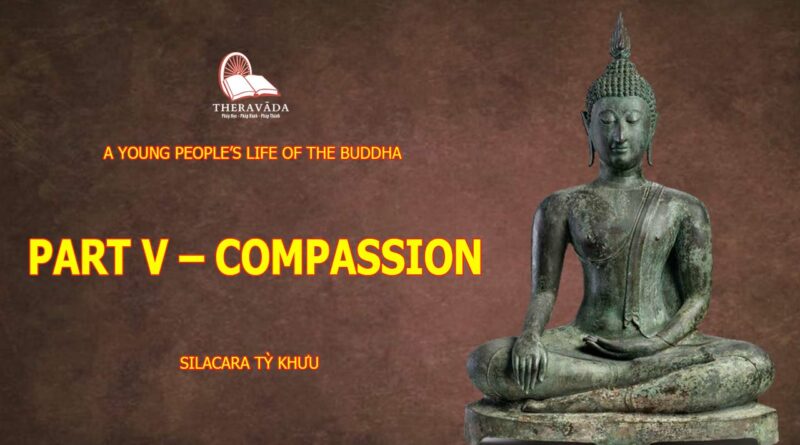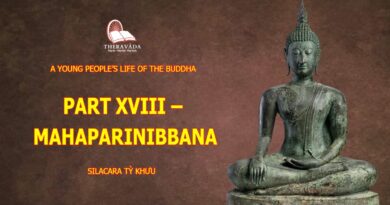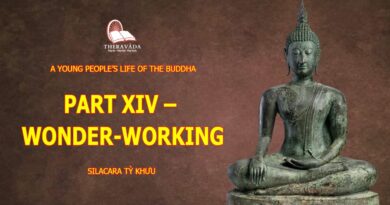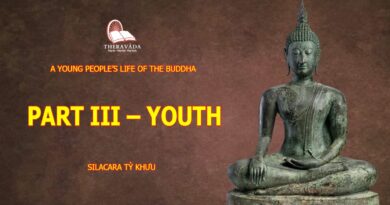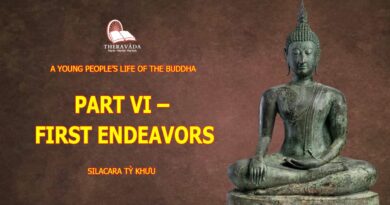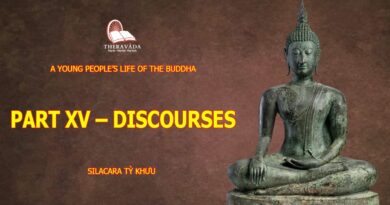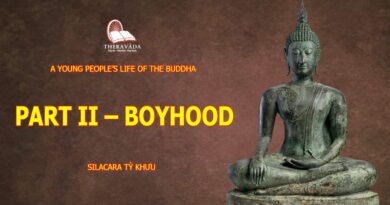A YOUNG PEOPLE’S LIFE OF THE BUDDHA: PART V – COMPASSION
After a short period of quiet reflection in a grove near the river bank where he had parted from Channa, the young Prince who was now only a wandering beggar, turned his steps southward towards the Magadha country, and in due time reached the chief city of that country, Rajagaha by name, where the King of the country, Bimbisara, had his principal palace. Here, with begging bowl in hand, Siddhattha went round the streets of the city, begging his food from door to door like any other religious mendicant. But he did not look like a common beggar. Those who saw him pass along could see by his very look that he was no ordinary religious mendicant, and they put into his bowl the best food they had.
When he had gathered enough, the prince-beggar left the city again, and in a retired spot outside the walls, sat down to eat what he had collected. But O, what a meal it was! Never in his life before had he, a prince by birth, and accustomed to the best of food served up in the most attractive and tempting way, had such a mixed mess as this set before him. His stomach simply turned in disgust at the sight of that bowl full of scraps and portions of all kinds of different foods, all flung together into one dish. He simply could not bring himself to eat the repulsive mixture. He wanted to throw it away and eat nothing rather than such a mess.
And then he stopped and began to think: and this is what he thought and said to himself:
“Siddhattha, you were born of a good family, in a king’s house, where you got everything good to eat that you could wish, the very best of rice, the richest and tastiest of curries, in all abundance. But in spite of this you made up your mind deliberately to live the life of a homeless beggar, and fare the same as every such beggar fares on what-ever was given you by the charitable. And you carried out your resolve: you became a homeless beggar: yet now, what are you doing? You do not want to eat the food proper for homeless beggars to eat — the food that is given them, whatever it may be. Do you think that is a right thing to do?”
In these and in other words the prince-beggar reasoned with himself, chiding and scolding himself for his daintiness and fastidiousness in the matter of food, so unfitting in a beggar. And in the end, after a struggle with himself, he succeeded in overcoming his repugnance to the food lying in his bowl before him, and he ate it up without further ado, and never afterwards had any more trouble about eating what was given him to eat.
Meanwhile, the people of Rajagaha, King Bimbisara’s city, were all talking about the new religious mendicant who had been begging in their streets that morning, he had looked so different from the common run of religious mendicants, so refined, so noble looking! The talk even reached the ears of King Bimbisara in his palace, and he sent his servants to make enquiries and find out who the stranger mendicant could be. Very soon his messengers learned all about Siddhattha, and came back and told their master that he was the eldest son of the King of the Sakyas, the heir to the throne; and that he had left everything behind him in order to become a beggar and try to discover if he could, some way that would lead men beyond the reach of old age and sickness and death. As his servants told King Bimbisara this, he listened to them very much perplexed. Never before had he heard of a religious mendicant looking for anything so strange, so extraordinary. But it sounded great and grand, and worthy of a prince’s looking for it and perhaps is was not so impossible as it seemed, he thought. So he sent his men to ask the prince-beggar to stay in his city, and and he would provide a place for him to live in, and food, and everything else he required for his comfort; and he could settle down there and study and meditate and carry on his search. But Siddhattha declined the King’s kind offer, saying that he could not stay still anywhere until he had found what he sought. After he had found it, perhaps then he might be able to stay in one place. So then the King made him promise that when he had found what he was seeking, he would come and stay in his city and let him and his people know about it first.
So the prince-beggar left Rajagaha behind him, and passed upon his wandering way into the open country towards a hill on which a great many hermits were living from whom he thought he might be able to learn something about life and death and how all the ills connected with them might be overcome.
And as he went along the road, he saw a cloud of dust coming down the mountain side, and heard the patter of feet; and then out of the dust there came into sight a herd of sheep and goats making their way to the plain. But behind them all, painfully limping along, came a little lamb, its leg hurt, and bleeding, but still trying hard to keep up with its mates. And when Siddhattha saw it, and noticed how anxious about it the mother sheep was, his heart was filled with pity.
He picked up the little creature and walked alongside the rest of the sheep carrying the lame lamb in his arms. “Poor little thing,” he said, speaking to the lamb, “I was going to join the hermits on the hills, but it is at least as good a deed to ease your little heart of suffering as to sit up there with these praying hermits.”
Then he saw the men who were driving the herd and he asked them where they were going and why they were driving their flocks away from pasture in the heat of the day instead of in the cool of the evening. They answered him that they had been ordered to bring a hundred sheep and a hundred goats down to the city during the day in order that they might be on hand and ready for the great sacrifice that was going to be offered that night by the King. “I will go with you,” said the prince-beggar; and he walked along with them and their flock, still carrying the lame lamb in his arms.
And now, as he came near to the riverside, a young woman came up to him, and after saluting him with great respect, said to him: “O Reverend Lord, have pity on me and tell me where I shall be able to find that seed which keeps away death.”
Siddhattha looked at her as if he would ask her what she meant.
The woman noticed his look, and went on:
“Do you not remember, Lord? Yesterday I brought you my little son who was sick, so sick that he was near to dying, and asked your reverence if there was no medicine at all that would keep him alive, for he is my only son. And your reverence said yes, there was something that might save him from dying, if I could get it — a tola’s weight of black mustard seed got from a house in which no one ever had died.”
“And did you get that seed, sister?” said Siddhattha with a tender, wistful smile.
“Nay, Lord, I did not,” said the woman sadly. “I went round all our village to every house asking for black mustard seed, and everybody was very willing to give me some, but when I told them that I only wanted it from them if no one had ever died in their house, they said that that was a queer thing for me to say, for everybody knew there had been a death in their house, and sometimes more then one death. Some said a slave had died with them. In some houses it was the father who had died; in some the son; in some the mother; in some the daughter. But in every home, every house, some one had died. I could not get my seed. O Reverend Sir, tell me where I may get that seed before my little son dies. Are there no homes at all where death has not been?”
“You have said it,” Siddhattha answered the now weeping woman. “In all the wide world there are no homes where death has not been. Now you have found this out for yourself. Now you know that yours is not the only grief in the world. Now you know with your own knowledge that all the world weeps along with you for some dear one dead. Go home and bury your child. As for me, sister, I go to find if I can, what will put an end to your and all men’s sorrow; and if I find it, I will come again and tell it to you.”
So Siddhattha passed on his way and entered the city along with the herd of animals that were going to be killed, and still went with them right up to the palace where the sacrifice was to be made. Here the King was standing with the priests all round him chanting their hymns to the gods; and soon the altar fires were lit and the priests made ready to kill the animals that had now arrived. But just as the chief priest was about to plunge his knife into the throat of the first goat that had been picked for the sacrifice, Siddhattha stepped forward and stopped him. “No, Maharaja,’ he said to King Bimbisara, “do not let the priest strike that poor goat.” And before any one knew what he was going to do, he untied the rope of grass with which it was fastened, and let it go back to its mates. And no one, not even the King nor the chief priest, thought of trying to stop him from doing it, so great and noble did he look as he set the goat free and allowed it to run back to the rest of its fellows.
Then the Prince-beggar began to speak to the King and the priests and all who had gathered there to see the great sacrifice of blood, about what a wonderful thing life is; how anybody can destroy it, but how impossible it is for any one to restore it once it has been destroyed. Every creature that lives, so he told those round him, is fond of its life, fears to die, just as much as men do. Why then should men use their power over these poor brothers of theirs only to rob them of what man himself is most fond of — the wonderful thing, life. If men wish to receive mercy, he said, they ought to show mercy. If men kill, then according to the law that rules in the world, they will be killed. And what kind of gods, he asked them, can they be who are pleased with and take delight in blood? Certainly not good gods, he said. Rather they must be demons to take pleasure in suffering and death. No, he ended, if men wish to taste happiness themselves in the hereafter, they must not cause unhappiness to any living creature, even the meanest, here in this world. Those who sow the seed of unhappiness, of pain and suffering, will certainly have to reap a full-grown crop of the same in the future.
In this way did Siddhattha speak to the King and the priests and people of Rajagaha, and did it so gently and kindly, and yet so powerfully, that the minds and hearts of the King and the priests were quite changed. There and then the King issued an order that henceforth throughout the whole of his Kingdom there were to be no more sacrifices in which living creatures were deprived of life. After this day, everybody in his realm, King and priests and people alike, were to offer to the gods only such gifts as did not involve the taking of any living creature’s life. They were only to offer as sacrifices to gods, flowers and fruits and cakes, and other similarly bloodless offerings.
And now once more King Bimbisara begged Siddhattha to stay in his kingdom and teach him and his people the good way of kindliness and pity and compassion towards everything that has life. The prince-beggar thanked him for his kind offer but told him that he had not yet found what he was seeking, and until he had found it, he could not rest, but must still go on searching for it everywhere among all the wise men of India, in case any of them knew or in any way could help him in his search.
Source: Budsas.net

